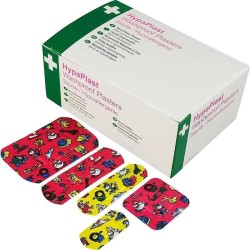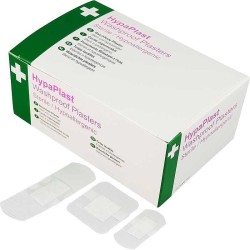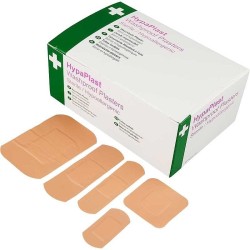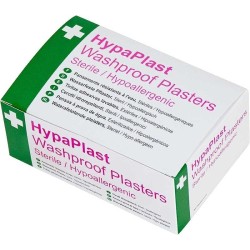First Aid Washproof Plasters
There are 4 products.
Active filters
About First Aid Washproof Plasters
Water-Resistant Protection for Everyday Activities
First aid washproof plasters provide water-resistant wound protection suitable for everyday activities involving hand washing and moisture exposure across workplaces, care facilities, food handling, and general contexts throughout England, Scotland, Wales, and Northern Ireland. These practical plasters comprise materials resisting water penetration during brief exposure such as hand washing, offering reliable protection for wounds whilst maintaining hygiene through frequent washing. Organisations rely on washproof plasters for wound protection during routine hand washing, food handler wound care enabling hygiene compliance, care facility wound management, workplace hygiene maintenance, and practical everyday first aid. Modern washproof plasters incorporate features including water-resistant materials maintaining protection during hand washing, strong adhesion preventing lifting when wet, comfortable coverage, varied sizes accommodating different wounds, and cost-effective provision. The provision of washproof plasters demonstrates commitment to hygiene-compatible wound care, supports hand hygiene compliance, enables practical injury management, and fulfils everyday first aid requirements across professional contexts requiring frequent hand washing throughout working environments.
The implementation of washproof plasters directly supports hygiene compliance, practical wound care, and demonstration of appropriate first aid provision in moisture-exposed environments. Workplaces requiring frequent hand washing benefit from wound protection maintaining coverage despite washing. Washproof plasters address these needs by providing water-resistant protection during hand washing, enabling continued hand hygiene compliance despite wounds, supporting food handler hygiene requirements, maintaining coverage in care environments with frequent washing, and demonstrating practical professional wound care. Application scenarios include food handling wound care enabling hygiene compliance, healthcare worker protection, care facility resident wound management, workplace hand hygiene maintenance, and general situations requiring reliable protection despite hand washing. Organisations benefit from washproof plasters through maintained hygiene standards, practical wound care not compromising hand washing, food industry compliance support, and reliable everyday protection. Modern washproof plasters incorporate features such as enhanced water resistance and improved adhesives throughout England, Scotland, Wales, and Northern Ireland.
Selecting and implementing washproof plasters requires assessment of hygiene requirements, appropriate specification, and integration with first aid and hygiene protocols across organisations throughout the UK. First aid, safety, and hygiene managers should evaluate hand washing frequency and intensity, assess wound protection needs in moisture-exposed roles, consider food industry or healthcare requirements, and calculate adequate stock levels. Product selection should prioritise appropriate water resistance for hand washing whilst recognising limitations for extended water exposure, varied sizes accommodating different wounds, strong adhesion maintaining position when wet, comfortable materials, and adequate quantities ensuring availability. Implementation protocols should encompass integration with first aid kits particularly in hand washing areas, education on washproof plaster appropriate use and limitations, hygiene procedures, and documented supply management. Quality assurance measures should include regular stock checks, usage monitoring, evaluation of performance in wet conditions, and restocking procedures. Modern washproof plaster management may integrate with hygiene compliance systems. Organisations should establish wound care procedures including appropriate washproof plaster use in hand washing environments, integrate with hand hygiene protocols, and maintain documentation. Food handling and healthcare environments benefit from readily accessible washproof plaster stocks. Staff education should address washproof plaster characteristics and limitations, appropriate scenarios for use, correct application on clean dry skin before hand washing exposure, and recognition that washproof plasters resist brief water exposure during hand washing but are not suitable for swimming or extended immersion. Storage should protect plasters whilst ensuring accessibility in hand washing areas. By implementing washproof plasters alongside professional hygiene protocols, organisations throughout England, Scotland, Wales, and Northern Ireland demonstrate commitment to hygiene-compatible wound care, practical first aid provision supporting hand washing compliance, appropriate wound protection, and reliable everyday injury management across all working environments requiring frequent hand hygiene whilst maintaining wound coverage.




